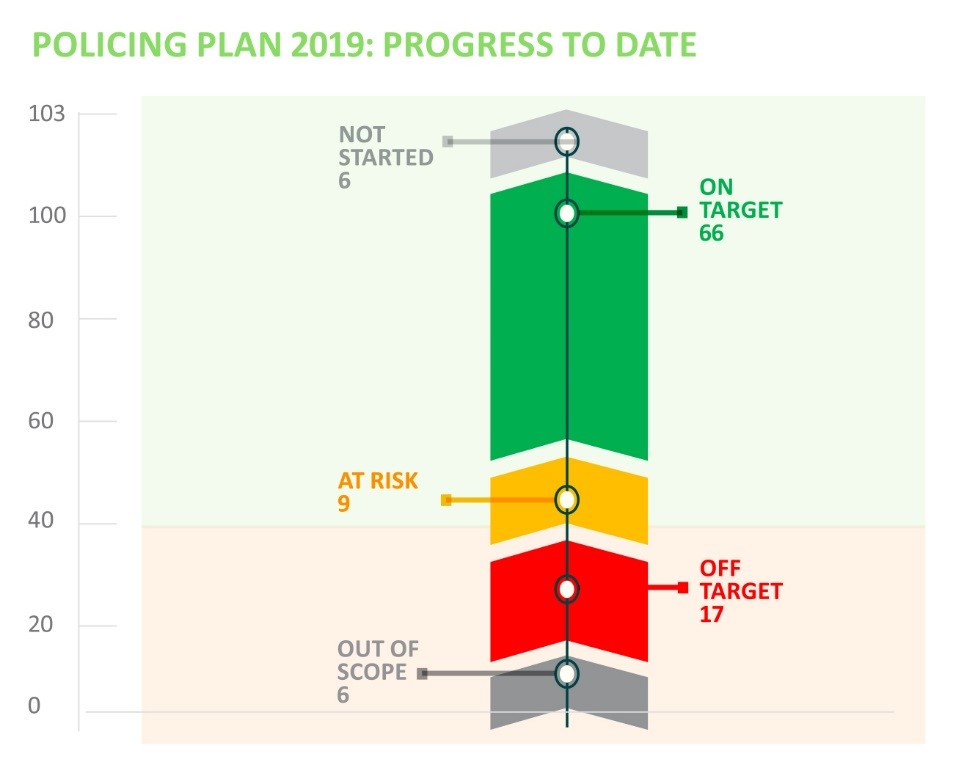
The Policing Authority today publishes its half-year assessment of the Garda Síochána’s performance against the Annual Policing Plan for 2019. The Policing Plan sets out the Garda Síochána’s commitments to the community regarding the policing service it will deliver in that year. This assessment by the Authority is a key mechanism by which performance against the Garda Síochána Statement of Strategy and Policing Priorities is carried out on behalf of the public.
- The Policing Authority has found that the Garda Síochána has made substantial progress against the commitments in the 2019 Policing Plan. Almost all of the commitments in the plan aimed at reducing crime and the fear of crime are on target.
- Divisional Protective Service Units, which deal with certain serious crimes including sexual crime, will be accessible to victims in every division in the country by the end of this year.
- In the area of Roads Policing, there has been an increase in ‘lifesaver’ detections, which includes mobile phone, seatbelt, speeding and drink driving offences.
- There has been an increase in reporting of sexual offences in the first six months which may indicate an increased confidence in detecting these types of crime.
- Progress has been made on the National Drugs Strategy including the appointment of divisional inspectors.
- 230 Gardaí have been redeployed onto frontline duties so far this year
- 80% of the Gardaí and staff of the organisation have now signed the Code of Ethics
There appears to be a clear sense of pace, effort and direction focused on the delivery of the Policing Plan. Key essential pieces of work relating to the future state of the Garda Síochána have now been produced, including the People Strategy and statement of the desired culture of the organisation. Since the finalisation of this report by the Authority, the Garda Síochána has also launched its new Operating Model. The Authority welcomed this and will continue to engage with the Garda Síochána on the implementation and effective delivery of this significant initiative.
The Authority was disappointed not to be able to make an assessment regarding performance against numerical targets in the Plan relating to crime levels and detections. This is because the Garda Síochána is pursuing a new approach to measurement, but has not yet finalised the revised system of presenting crime data. This is of concern to the Authority. Detections reflect the Garda Síochána’s capacity to solve crime and are important in maintaining public confidence in the law enforcement. Against a background where the Central Statistics Office crime statistics are published ‘under reservation’ and where the Garda detection rates dropped in 2017 and 2018, the absence of reliable data limits the Authority’s ability to assess key performance measures and to provide the public with a sense of progress.
The Authority will assess this Policing Plan commitment as soon as the data is available.
The Policing Authority welcomes the considerable progress against a number of key commitments in the 2019 Policing Plan, but is aware that challenges remain to the full realisation of the plan.
- Staffing issues are a recurring challenge, affecting a number of areas including the expansion of armed response capacity and the roll-out of Divisional Protective Service Units.
- There is a heavy demand on IT, finance, facilities and human resources across the organisation.
- Progress has been slow in relation to developing a way to track call-backs to victims of crime after an investigation and in relation to making sure that victims of domestic abuse get a call-back within 7 days.
- The Garda Reserve Strategy has been drafted but is yet to be finalised and is therefore off-target.
The Policing Authority will continue to assess policing performance across the remainder of the year and will publish a full year assessment in early 2020.
For the full report, click here.



